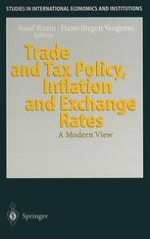Ass a f R a z i nand Hans-Jiirgen Vosgerau The eight chapters of this volume have been grouped into two parts. Part A of contains chapters which are mainly monetary in character, whereas real aspects international economics are treated in Part B. It goes without saying that this is only a device for structuring the field. In substance most chapters reveal the close connections between real and monetary aspects. Part A on "Inflation, Exchange Rates, and Macro-Economic Adjustment in the Global Economy" consists of four papers. In recent years, an inflation targeting framework for monetary policy has been adopted by New Zealand, Canada, the United Kingdom, Finland, Sweden, Australia, and Spain (in chronological order). The use of inflation targeting can be viewed as a further step in the evolution of monetary policy techniques adopted by central banks. A common feature of the countries that have adopted inflation targets is the relatively poor inflation record over the last 30 years compared with other industrial countries such as Germany, Switzerland, Japan and the United States. Because of their relatively good inflation record, this latter group of countries has not explicitly adopted inflation targeting. With, or without, explicit inflation targeting the monetary policy credibility hinges on the independence of the central bank. Alex Cukierman addresses the issue of central bank independence by surveying alternative ways to characterize independence.
